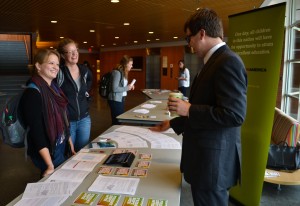By Chase Booth & Claire Graebner
boothcha@grinnell.edu graebner@grinnell.edu
On a college campus such as Grinnell’s, there is always a certain level of talk about education. But this past week, there was an added focus as the Rosenfield Program hosted a symposium exploring topics from how best to prepare teachers to how to evaluate them once on the job.
The planning of the symposium, titled “Who Should Teach Our Children?: Education and Democracy Worldwide” began last spring when Dana Utroske ’13 and the education department proposed the idea to the Rosenfield program.

“Students on the Rosenfield Program Committee were very excited about this topic, so this one was truly a collaboration from the beginning,” said Sarah Purcell, Director of the Rosenfield Program.
Jason Glass, Director of the Iowa Department of Education and one of the speakers at the symposium, discussed Iowa’s standing on the National Assessment of Educational Progress, known as the nation’s “report card.”
“If we go back to the 1990s, Iowa was the top performing system in the country,” Glass said.
However, he discussed how Iowa has slowly fallen into the middle of the rankings since then. The lecture also covered broad topics about policy issues and his plans to return Iowa into the top spot in education.
Another speaker, Jim Wyckoff from the University of Virginia, analyzed the effectiveness of teachers and how the U.S. education system can improve upon the quality of its teachers.
He showed data from the New York City Public Schools showing marked improvements in teacher effectiveness when uncertified teachers were replaced with certified teaching fellows or members of Teach for America.
Other speakers included the executive director of WorldTeach, an organization providing volunteer teaching opportunities across the world, a professor from Michigan State University specializing in teacher preparation and even a Grinnell alumnus, Dan Covino ’10, who now teaches high school in Grinnell.
“I think that a lot of time and planning goes into these symposia and we have these incredible resources and incredible people who do amazing research or who are really prominent people out in the world,” Purcell said.
Now that the planning has come to fruition, Utroske says that the symposium mainly addresses issues such as “the role of education in democracy, informing democracy, and . . . preparing citizens to participate in democracy.”
Additionally, Purcell said that the symposium aims to generate discussion about teaching and learning, both inside and outside of the classroom.
“I think it does have a dual role of thinking about policy issues, but also giving students a chance to think about their own calling in life and possible careers in teaching,” Purcell said.
With those goals in mind, topics covered in the symposium included “Building a World-Class Education System for Iowa” and “Social Justice Starts in the Classroom: Teach For America’s Approach to Ending Educational Inequality.”
While Grinnell College sponsored the symposium, it has brought many different communities together.
“This symposium has been drawing a lot of folks from the schools around Grinnell, in Grinnell, and surrounding areas and just a different way to get to know people of different ages who you might not meet in the dining hall,” Purcell said.
Another important aspect of the symposium was discussing how colleges such as Grinnell could affect education beyond their own communities.
“We are also interested in what the role is of a liberal arts college, particularly Grinnell, but any liberal arts college,” Purcell said. “Do we have intervention to make in that debate and, at the same time, we are interested in the debate from a policy angle, but we also want to turn the lens on ourselves and think about what we are doing and what we are all interested in.”
In addition to faculty support, the symposium enjoyed strong student support. Neil Thomas ’14, whose perspective on education is influenced by his mother’s work as a high school secretary, found the events stimulating.
“These are big questions for me, and I really think that’s how you determine the future. It’s great that we’re asking these questions,” Thomas said.
Future symposia headed by the Rosenfield Program this year include topics over “Sustainability and Corporate Social Responsibility” in February, “Human Trafficking” in April, and coming up in November the “Grinnell Prize Symposium.”


















































